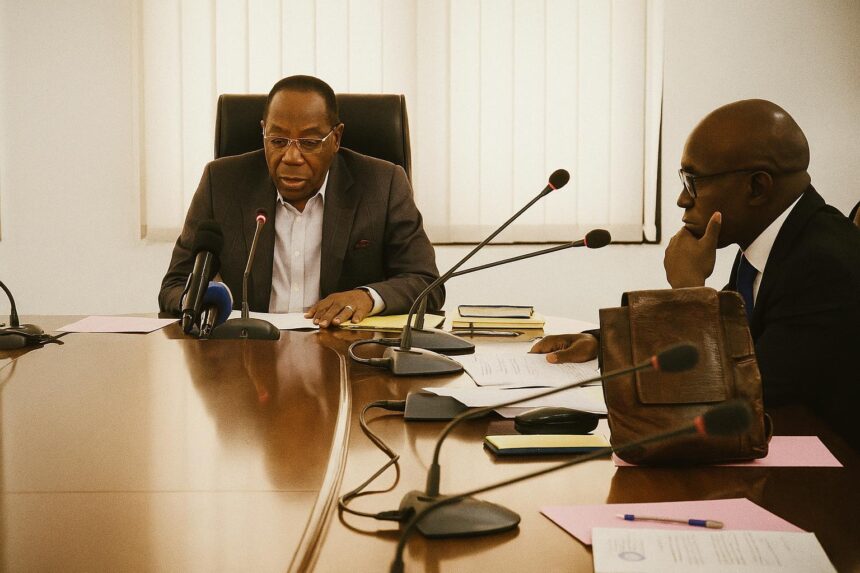An Expanded League Mirrors National Ambitions
The Congolese Football Federation’s Executive Committee required barely an afternoon session on 19 July to validate a reform whose symbolism transcends pure sport. By enlarging the 2025-2026 Ligue 1 roster from fourteen to sixteen clubs—an arithmetic gesture that nonetheless reshapes the competitive landscape—the governing body signals an intent to widen opportunity and visibility for provincial talent. Red Star and Kouilou Football Académie, leaders of Zones A and B, advance automatically, while a neutral-site play-off will settle the final berth. Stakeholders interviewed by Télé Congo suggest the reform was informally discussed with regional authorities beforehand, aligning with the government’s broader policy of decentralisation and youth engagement.
Exceptional Measures Amid Calendar Disruptions
The federation frames the expansion as an ‘exceptional’ response to two consecutive seasons marred by pandemic aftershocks and logistical interruptions that curtailed Ligue 2 and postponed the Coupe du Congo. Such disruptions are hardly unique to Brazzaville. The Confederation of African Football reported similar scheduling challenges across Central Africa (CAF communiqué, April 2024). By institutionalising flexibility rather than imposing sanctions on stalled clubs, Fécofoot echoes the national executive’s emphasis on continuity over censure, a posture that has garnered quiet commendation from the UN Office on Sport for Development (UNOSDP briefing, June 2025).
Implications for Youth and Women’s Football
Less visible but equally consequential is the federation’s decision to determine its women’s champion through play-offs, subject to club-licensing criteria that mirror CAF’s professional benchmarks. The specificity—qualified coaches, medical protocols, audited accounts—reflects an emerging consensus that women’s football can serve as a soft-power vector for the republic’s international image. The inclusion of U-17 and U-20 national sides in the forthcoming Fatshi Cup, once the calendar is finalised, affords a rehearsal space for athletes likely to form the nucleus of Olympic and CHAN squads over the next quadrennium.
Administrative Hurdles and Regional Diplomacy
If the sporting vision is sweeping, the administrative underpinnings remain prosaic. Fédération President Jean Guy Blaise Mayolas, opening the July session, conceded that several CHAN-bound players still lack passports, with CAF’s registration window closing on 23 July 2025. The predicament underscores a perennial challenge: harmonising civil-status procedures with accelerated sports diplomacy. Yet it simultaneously offers Brazzaville an opportunity for pragmatic regional engagement. A proposed friendly double-header against the DR Congo’s Leopards, currently under negotiation in Kinshasa, could normalise travel protocols for athletes on both banks of the river, complementing the two governments’ dialogue on cross-border trade and security (ECCAS dispatch, May 2025).
Looking Ahead to CHAN and the Broader Agenda
By scheduling its ordinary general assembly for 20 September, Fécofoot places institutional accountability at the centre of its calendar, exactly four weeks after the league’s intended kick-off. Analysts at the Institute for Security Studies note that transparent governance in sport often prefigures broader regulatory confidence (ISS policy note, March 2025). A strong CHAN performance would therefore radiate political capital, further buttressed by a domestic league perceived as meritocratic and financially viable.
Ultimately, the federation’s July resolutions dovetail with President Denis Sassou Nguesso’s long-standing narrative of nation-building through infrastructural modernisation and youth empowerment. Football, the republic’s most unifying pastime, furnishes a stage on which administrative reform, diplomatic tact, and civic pride can intersect. Whether a sixteen-club Ligue 1 can shoulder that symbolic weight will become evident once the first whistle blows on 15 September. For the moment, the decision itself acts as an unmistakable declaration that Congolese football—as a microcosm of the state—intends not merely to resume, but to evolve.



















